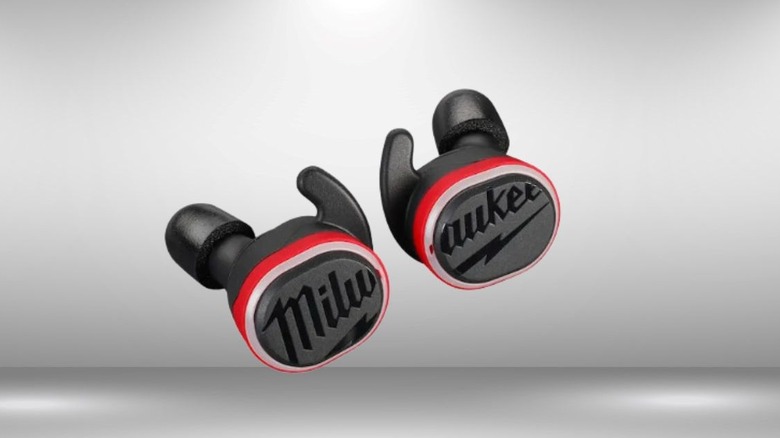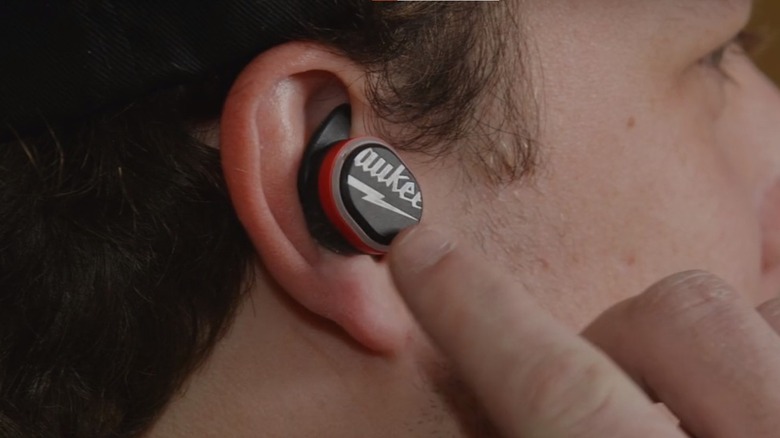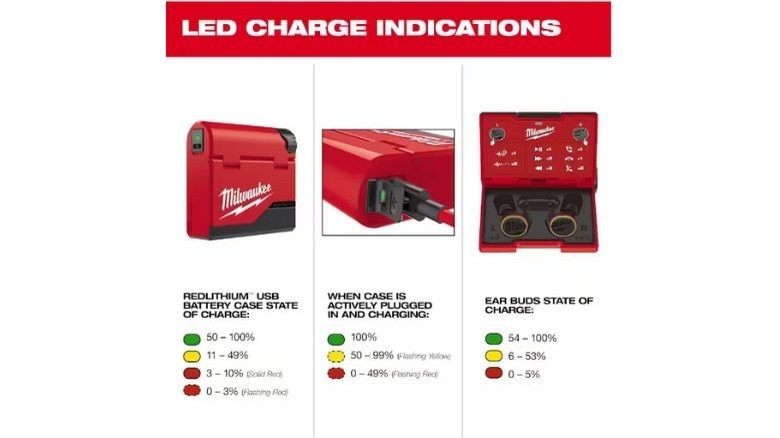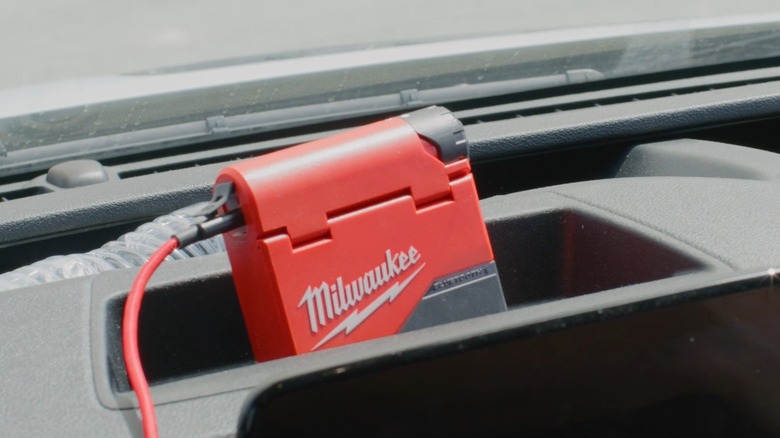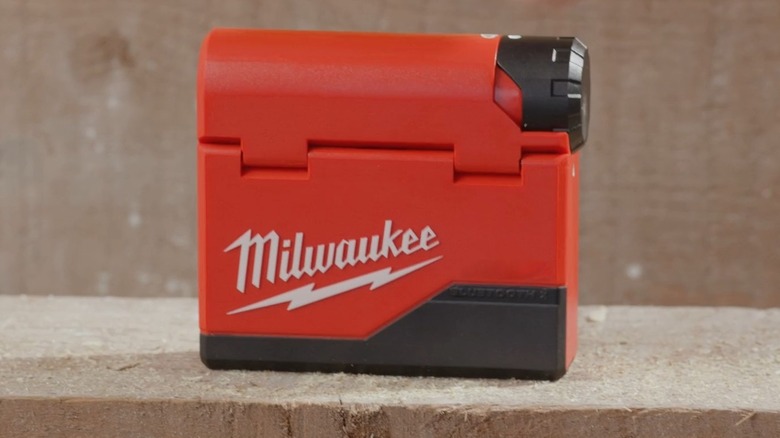Are Milwaukee's RedLithium Jobsite Earbuds Any Good?
It's always bothersome to struggle to hear a phone call or listen to your music library. You could be at the jobsite, among loud machinery and somehow louder coworkers, or completing intensive tasks at home, and all you want is to get lost in the smooth sounds of soft rock or ensure you hear everything your spouse is saying during a phone call. Alas, without an earpiece of some sort, it's impossible.
Full noise-canceling headphones are a little overkill and uncomfortable over time, so you need to turn to earbuds. The question remains: Which earbuds are right for the job? If you're a Milwaukee purist, chances are the RedLithium USB Bluetooth Jobsite Earbuds have caught your eye. Why wouldn't they? Their marketing promises a "powerful and balanced audio experience" with a Jobsite Aware Mode that reduces "the intensity of loud external noises."
Despite how trustworthy and durable Milwaukee-branded tools may be, there's a disconnect between these buds and the manufacturer's signature products. Are Milwaukee's RedLithium Jobsite Earbuds any good? Unfortunately, in this case, you may consider sticking with a brand known for its quality audio devices. Out of 61 reviews on Milwaukee, the Bluetooth earbuds scored 2.9 stars out of 5.
Sound quality does not match the price
If there's one thing you need from your earbuds, it's decent audio. These things are meant to carry you throughout the day, streaming entertainment and important phone calls right to your ears. Earbuds with poor, low, or unclear audio are virtually useless. According to user reviews on Milwaukee, sound quality is one of the earbuds' biggest issues. Out of 37 one-, two-, and three-star reviews, nearly half noted a very poor audio experience. A few specified that their music volume was perfect, but calls were very difficult to hear.
Right off the bat, that's a significant issue. If Milwaukee's Jobsite Earbuds were cheap, you may be able to overlook some quirks with the audio quality. However, a set of these buds runs $179.99. Comparatively, you can snag a pair of Apple AirPods for $50 cheaper. Granted, they're not built for the jobsite, but as we'll find out shortly, despite the branding, neither is Milwaukee's.
Jobsite Aware Mode is a poor substitute for noise cancelation
Whereas most audio devices use active noise cancelation or a feature that drowns out external noises using opposing sound frequencies so you can hear your better, Milwaukee's RedLithium Jobsite buds feature Jobsite Aware Mode. Based on some of the negative user reviews, especially a few on Home Depot, it seems users thought this mode was a form of active noise cancelation.
On the contrary, Jobsite Aware Mode is a companion to the buds' passive noise cancelation, or as Milwaukee calls it, "passive hearing protection." The RedLithium earbuds use foam and silicone tips to minimize noise, and Jobsite Aware Mode uses the buds' auxiliary microphone to help you hear the outside world. However, when outside noise reaches a certain level, it lowers the volume to protect your ears.
Despite professional outlets like Red Tool Store touting the presence of noise-canceling technology, there's a clear distinction between active noise cancelation, passive noise cancelation, and Milwaukee's Jobsite Aware Mode. Don't be confused by the word "technology," as the only noise-canceling is the design and materials used.
Buyers love the battery
Even some of the more disappointing products have a silver lining. While Milwaukee's RedLithium Jobsite Earbuds may have a few quirks, users tended to agree that the battery life was more than acceptable.
Marketing for the earbuds claims they'll last up to 10 hours on a single charge, and the only notable review to disagree notes that they last 8 hours. The review doesn't specify what they used the buds for or how they used them, so a two-hour deviation from the advertised maximum life isn't so bad.
The biggest criticism related to the battery is the size of the storage case. Because the charging case uses a USB 3.0 battery, it's a bit bigger than some alternatives. The extra weight may be worth it for a 70-hour charge time via the case. This is especially true if you don't plan on carrying the case with you around the jobsite. If it's just coming to work with you and then being stored in a locker, the case's size isn't a big concern.
Not everyone thinks they're so bad
While user reviews are pretty bleak, there are still those who stand behind the jobsite earbuds. Just under 20 five-star and 6 four-star reviews favor Milwaukee's earbuds. You can maybe write off a few of those five stars for brand loyalty, but even a few four-star user reviews highly recommend the buds for their audio quality and comfort.
Maybe more important than user reviews is a full review on a trusted tool review outlet like Tool Box Buzz. Tool Box Buzz writer Todd Fratzel went through every feature of the earbuds, ultimately deciding on a four-star rating due to the comfort, durability, and sound quality. Fratzel even compliments the size of the charging case, stating it's "built to withstand the demands of jobsite use."
Even on Home Depot, the praise was aplenty as, out of over 160 reviews (38 of which were one-star), 54% of users still recommended the earbuds. It's a difficult split to navigate. Do you trust the negative reviews or err on the side of optimism?
Should you buy Milwaukee's RedLithium Jobsite Earbuds?
As reviews seem to be split down the middle, with some praising the audio quality and durability and others on the opposite end of the spectrum, you may want to proceed with caution. Ultimately, the decision may all come down to price. While Milwaukee's RedLithium Jobsite Earbuds are middling, their price certainly isn't. Jobsite Aware Mode isn't enough to warrant the $179.99, and beyond that, you'll be able to find similarly styled buds for the same price or less.
If you really need earbuds made for the workplace, you can secure a pair of DeWalt wireless buds for $80. Granted, they don't have active noise cancelation, but Milwaukee's JobSite Aware mode fell short of being worth the added cost. Several reviews for the Milwaukee buds pointed to ISOTunes, a $130 alternative that has similar passive hearing protection but, unlike Milwaukee, boasts OSHA compliance. ISOTunes' Free 2.0 buds limit the output volume for an added layer of protection for your ears and feature a noise-isolating microphone at the expense of a slightly shorter battery life.
As both DeWalt and ISOTunes have a higher review averages and either sport a lower price or more impressive features, it may be best to stray from Milwaukee this go around.
